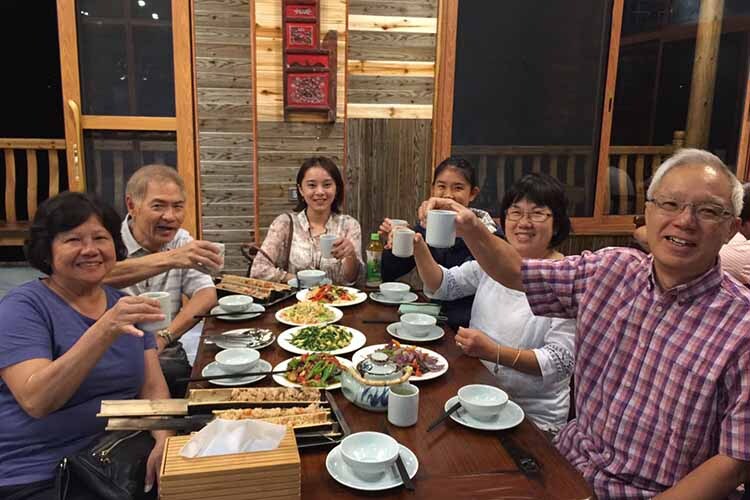20 New Ways To A Taste of China Best Local Foods
20 New Ways To A Taste of China Best Local Foods
Blog Article
Top 10 Tips To Explore Chinese Regional Cuisines In China
1. Be aware of the eight Culinary TraditionsTip: Be familiar with the eight most popular Chinese food styles: Sichuan, Cantonese, Shandong, Jiangsu, Fujian, Hunan, Anhui, and Zhejiang. Each one has distinctive flavors methods, dishes, and techniques.You can plan your dining excursion based on your preferences.Con: It's difficult to remember the specifics of each cuisine.
2. Enjoy Local SpecialtiesTake a look at the local cuisine, be it Peking Duck, Xiaolongbao, or Hot Pot, in Chengdu.Pro: It guarantees a true and culturally rich dining experience.Con: May restrict your exploration of other dishes while you are in a certain region.
3. Take into consideration regional tastesTips. Sichuan cuisine has a spicy, numbing taste. Cantonese is light, crisp and delicious. Jiangsu's cuisine is delicate, sweet, and gentle. Select dishes according to your spice tolerance and preferences.It can help you avoid ordering foods that may not be your preference.Con Some flavor profiles need testing to find.
4. Explore Street FoodExplore the street food options in each city. For instance In Beijing you can find Jianbing, which are savory crepes. In Xi'an they offer Roujiamo, which is Chinese burgers. Take a bite of local food.Pros Street food is cheap, easy to prepare, delicious and is a fantastic way to see local tradition.Con: Hygiene can sometimes be a concern; choose vendors that have a high turnover.
5. Learn Basic Dining EtiquetteTips: Be aware of Chinese eating habits, for example sharing food with your family in a traditional family style and not sticking the chopsticks straight up into rice.Pro The gesture shows respect for the local culture, and improves your dining experience.Cons: Learning and adapting to a new etiquette can take time.
6. Ask locals for recommendationsLocals are often able to give you a good idea of the most popular restaurants or eateries within a specific area. Don't hesitate to ask your locals for advice.Pro: Ensures you find hidden gems and stay clear of tourist traps.Con: Communication can be difficult due to language barriers.
7. Be prepared for unfamiliar ingredientsIf you're looking for an innovative recipe, consider playing around with different ingredients. Be curious about new foods.Pro: Expands your palate and deepens your appreciation of Chinese food culture.Con: Some dishes may not be suitable for your tastes or diet.
8. Allowing Dietary RestrictionTip: Make use of Mandarin to convey food allergies and food preferences.Pro: It provides a safer dining experience tailored to your needs.Cons: Certain cuisines are not available as options for people with certain diet restrictions.
9. Mixing regional drinks and foodYou can try local drinks such as tea in Fujian or Baijiu in northern China.Pro: It adds depth and compliments food.Cons: Some people might not like the strong flavors of baijiu.
10. Avoid OverorderingTips Recommendation Chinese food is served in a family-style manner. Therefore, you should order in a conservative manner. If you're looking for more, you can add it.Cons: Food waste is prevented and multiple dishes can be tasted.Cons: The sheer variety of items available makes it tempting to purchase too many.
The benefits of exploring regional cuisines in ChinaExplore a range of tastes and methods.Cultural insight: Develop greater understanding of regional traditions and identities.The price of many local meals is reasonable.Memorable memories: Taste iconic foods that originate from their origins. This can create long-lasting memories.Pros and Cons of Exploring regional cuisines in ChinaHygiene Issues: Some street food or small restaurants might not be up to international standards for cleanliness.Language Barriers: Menus and descriptions might only be available written in Mandarin, making it hard to place an order.Unusual flavors and textures: For some people some flavors or textures may be unfamiliar.In some areas the strict vegetarians, people with food allergies, and vegans can have difficulties.If you adhere to these guidelines and are a bit adventurous, you will be able to taste the numerous delicious local Chinese dishes, while navigating the challenges. Have a look at the top China culinary hotspots for website info including Chinese food culture guide, food guide to China best cities, authentic tastes of China, culinary wonders of China, Chinese food you must try, taste your way through China, authentic Chinese culinary adventures, explore local Chinese cuisine, a guide to China food scene, a culinary journey through China and more.
Top 10 Tips For Tipping Tips For Tipping China
1. Tip: Tip: In China, tipping is not a custom.Benefits: You'll save money, and follow cultural standards.Con: This may feel strange to travelers used to paying a tip at home.
2. Find out about Service FeesTips: Many luxury hotels and restaurants will include a 10%-15% service charge in their bill. You don't need to leave a tip.Pro: No need to calculate or leave a note.Con: Occasionally, charges for services aren't always clearly stated.
3. Make sure to only apply this suggestion when it is appropriateTipping is required in tourist areas as well as international hotels. This applies to tour guides and hotel staff, drivers and other hotel employees.Pro: Even a tiny gesture of gratitude can show appreciation for exceptional services.Con: A lack of consistency in practices can create confusion in the area of tipping.
4. Offer Tips DiscreetlyYou can tip subtly if you want to ensure that the person you are tipping does not feel uncomfortable.Pro: Deters embarrassing or unwanted attention.Con: Some individuals might not accept the tip. This can lead to awkward situations.
5. Use Cash to TippingTip: If you feel tipping is appropriate, use cash, not adding it to your bill, because many payment systems in China don't include an option to tip.Cash is accepted all over the world and it's a breeze.Cons: Small denominations are required, which can be a hassle.
6. It is also possible to give tips to businesses that cater for touristsTipping: In places frequented by Westerners, it could be expected that you tip at the form of guided tours, restaurants or restaurants that are international.Pro: Integrates expectations with service providers who are familiar with Western standards.Cons: Encourages tipping when it is traditionally not needed.
7. Avoid Tipping Taxi DriversTipp: Tipping taxi drivers to pay for their services is not a common practice. Instead, you can add a few dollars to make it easier.Pro: Shows that you're willing to adhere to local customs.Con: In places other that tourist areas, rounding up may be misunderstood to mean an offer.
8. It is a good idea to consider tipping your Tour GuidesTipping is common for private and group tours in cities such Beijing or Shanghai. It is normal to leave tiny amounts like Y=50 - 100 Y.Pro: Rewards good service.Con: Setting expectations for visitors who will leave more.
9. Avoid Over-TippingTips: If you choose to tip, a small amount (5-10% or less) is enough. The tipping of large amounts can be viewed as excessive or unnecessary.Pros: You won't be a nuisance to locals, or invest too much.Cons: Reserving your tipping discretion is uncomfortable for people who have a habit of tipping generously.
10. Research Ahead of TimeIt is recommended to know the details of tipping rules in the specific region or establishment prior to your arrival. Certain provinces or companies catering to foreign customers may have different standards.Pro: You will be able to easily adapt to local customs and avoid misunderstandings.Con: It is important to take the time to investigate each area or location.
The Benefits of Tipping in ChinaCost Savings Tip-free: Not having to tip will result in lower overall expenses.Cultural Adaptation: Integrates with the traditional ways of life, encouraging respect and integrating.Simple - No need to calculate or carry around extra cash.The focus is on service: Recommends service providers to concentrate more on quality of service than on tips.The Cons of Tipping Behavior in ChinaUnfamiliarity with Tourists: Visitors who come from cultures that are tipping may have a difficult time make the transition.Awkward Situations : Providing the wrong tip can cause anxiety or confusion.Tipping is a new practice in certain areas of tourism, resulting in inconsistent practices.The absence of a tip may be the only way for some travellers can show their appreciation.These tips will assist you in navigating China's changing culture with ease. You will be able to enjoy a pleasant dining experience while respecting the culture of China. Have a look at the most popular culinary tours of China best cities for more info including food guide to China best cities, Chinese food you must try, the flavors of Chinese cuisine, taste the regional flavors of China, culinary wonders of China, authentic tastes of China, China culinary hotspots, explore the riChness of Chinese food, taste the regional flavors of China, the flavors of Chinese cuisine and more.